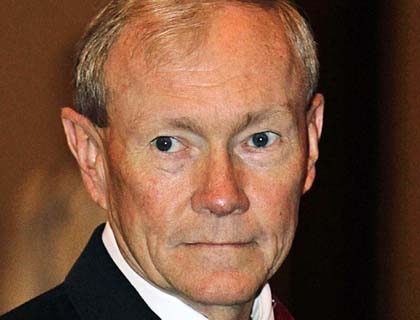KABUL - The top U.S. military officer and chairman of the US joint chiefs of staff Gen. Martin Dempsey on Saturday said he was confident enough U.S. troops will remain in Afghanistan after 2014 to accomplish the three-part mission agreed to by allies at last year’s NATO summit in Chicago.
Gen. Dempsey also said he did not know whether President Barack Obama would announce the size of the post-2014 U.S. force for Afghanistan during his upcoming State of the Union address, Reuters News Agency reported.
In the meantime he said an announcement on the management of forces in 2013 “has to come fairly soon, simply because we’re two months in(to)” the year.
According to the officials a decision on the size of the post-2014 U.S. force would be made before any announcement of the speed of the 2013 drawdown.
This comes as Afghan security forces are expected to take over full security responsibility by the end of 2014 which is a deadline for the complete withdrawal of NATO troops from the country.
While speaking to reporters before leaving to Afghanistan or a change of command ceremony for the International Security Assistance Force while playing down suggestion by some White House officials that the United States might consider a “zero option” Gen. Dempsey said no one had suggested that to him, “and I would never recommend zero.”
Marine Corps General John Allen will hand over command of the international coalition to Marine Corps General Joseph Dunford, expected to be the force’s last commander.
Dempsey said, “The military at this point is confident that the number will match the mission. Let me put it this way: I will not at any point ask 10,000 troops to do 20,000 troops’ work.”
He also said the only circumstance under which a zero option was likely to come into play was if the two sides failed to negotiate a bilateral security agreement, as happened in Iraq.
“This is why the bilateral security agreement is so important, because if we get this agreement in place soon, then it takes away all of the anxieties related to our enduring presence there,” he said.
Gen. Dempsey also noted that Afghanistan’s economy was considerably weaker than Iraq’s, which led Afghans to recognize they would need international support for the long-term, an issue that did not confront oil-rich Iraq. (KP)

